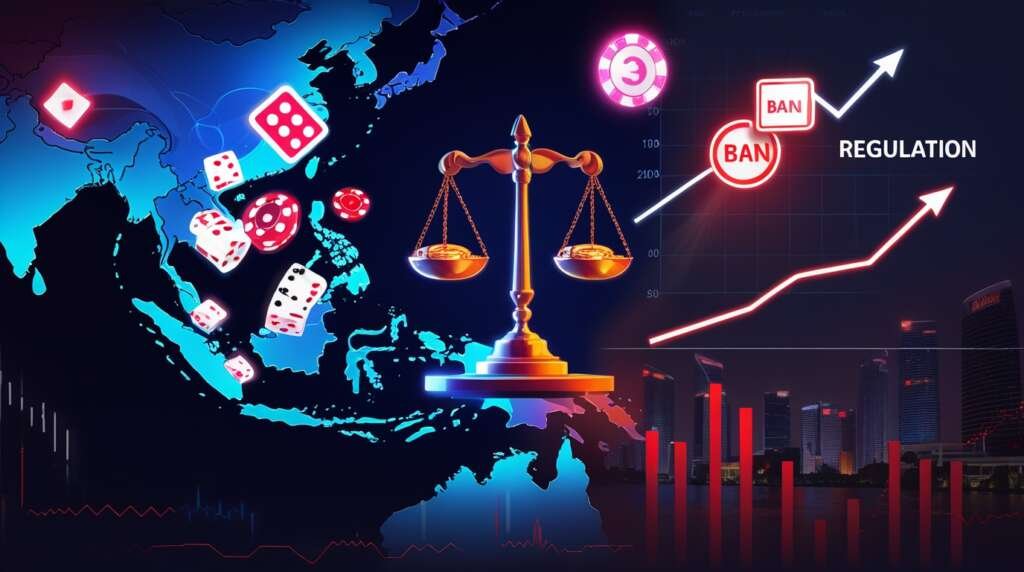Gambling has been a popular pastime for people all over the world for several centuries. People have engaged in gambling for fun, for trading, and to purchase goods over the years. The way we gamble has changed over time. Today, gambling is taking various forms around the world, in different jurisdictions, and under different forms of legislation. Southeast Asia is one of the most interesting areas in regard to gambling laws because of the amount of variation from country to country in terms of legal frameworks. Knowing how each area regulates gambling can help understand the behavioural aspects of people in that area, and institutionalize cultural attitudes in the area as well.
The Southeast Asian region consists of cultural diversity and religious conservatism, while also being home to fast-growing economies. However, when we talk about gambling legislation, the diversity is abundant. For example, you have countries such as the Philippines and Singapore that have developed an often highly regulated gambling industry, and there are countries like Indonesia and Brunei that have total bans based on cultural and moral norms.
Gambling Laws Across Jurisdictions
Thailand
Thailand aims to establish itself as a global gaming center, intending to develop a casino industry that produces billions in income, attracts major players in the industry, and supports a flourishing tourism sector.
Nonetheless, as of now, Thailand prohibits most types of gambling under its 1935 Gambling Act, allowing only the state lottery and horse racing. Although illegal gambling is pervasive in Thailand, the country is now looking at ways to legalize gambling by way of the proposed Entertainment Complex Bill. This Bill allows gambling by creating as many as five casino resorts in certain tourist areas such as Bangkok, Phuket, and Chiang Mai. The government has framed the bill to promote tourism, tax revenue, and jobs.
About the Entertainment Complex Act (Approved in principle by the Thai Cabinet in January 2025)
Entertainment Complex Requirements: Each licensed project must have at least four non-gaming amenities – hotels, malls, convention centres, theme parks, dining, nightlife, sports stadiums, waterparks, yacht clubs, or cultural centres – in addition to a casino. In most cases, the casino floor area cannot comprise more than 10% of the total area.
Licensing Criteria: Only Thai registered companies (public or private) with a minimum paid-up capital of THB 10 billion (~US$272 million) may apply
Duration of License and Fees: License duration will be for 30 years, with the ability for annual renewals in 10-year increments. The licensing fee will be THB 5 billion, with the yearly fee of THB 1 billion. A new Entertainment Complex Policy Committee will be established and chaired by the Prime Minister to administer licenses.
Location and Technical Restrictions: Casinos must be located in special zones (to be regulated by royal decree). All gambling must be on the premises, meaning there is no online or remote gambling, no live-streamed gambling, and no remote entry of players.
However, there is resistance from religious congregations and civic groups. The suspension of Prime Minister Paetongtarn Shinawatra from parliament has further delayed the parliamentary debate regarding the bill. While these legal efforts unfold, online gambling in the region is growing exponentially, even though it is often illegal and facilitated through offshore sites. The implementation of the Entertainment Complex Act has been temporarily put on hold, with the cabinet approving the withdrawal of the bill amid a cabinet reshuffle, while stating that it may be considered on a later date.
Singapore
A variety of legislations regulate gambling activity in Singapore. These laws include, among others, the Casino Control Act, the Gambling Control Act, and the Gambling Regulatory Authority of Singapore Act. The Gambling Regulatory Authority of Singapore (GRA) began operations on August 1, 2022, after the reorganization of the Casino Regulatory Authority of Singapore (CRA). The GRA is a statutory board that oversees gambling across Singapore. It is a statutory authority in Singapore set up under the Ministry of Home Affairs.
Singapore Pools is the only operator in the country that is authorized to conduct lotteries. Casinos are only allowed in the form of integrated resorts (IR). Examples of IR casinos are Marina Bay Sands and Resorts World Sentosa, which include dining and stays, meetings, entertainment, theme parks, high-end shopping, in addition to the casino as part of the IR offering. Organizations are permitted to run slot machines in specific rooms according to the Gambling Control Act.
Prior to the establishment of the Gambling Regulatory Authority (GRA), there existed a variety of regulatory authorities with jurisdiction over gambling undertakings in Singapore. Currently, since 2022, there is only one regulatory authority – the GRA.
On April 3, 2020, the Ministry of Home Affairs (MHA) announced its intent to create a new Gambling Regulatory Authority with an established deadline of 2021, which would be designed to consolidate gambling regulation in Singapore, instead of multiple disparate government agencies like the Casino Regulatory Authority (CRA) which regulates casinos, and the Gambling Regulatory Unit (MHA). The Singapore Police Force would continue to enforce the law in relation to illegal gambling, and the Ministry of Social and Family Development would continue dealing with gambling and gambling-related social issues.
At the same time, existing gambling regulations were also set to be reviewed and finalized in conjunction with other activities that aren’t mainstream “gambling,” like physical mystery boxes or online loot boxes.
The GRA was established from the CRA starting August 1, 2022. The GRA is a statutory board of the Ministry of Home Affairs, which will take an overarching role to regulate the gambling sector in Singapore.
Indonesia
Indonesia is the fourth most populous country in the world with a predominant majority of more than 85% of its population being Muslims. The only reason we have strict laws and rules towards gambling and other activities considered illicit is because of the culture and beliefs of the people in that region. The consumption of alcohol, gambling or betting over a game, and any kind of illegal actions are prohibited by the Islamic faith, and it is reflected in the legislations and regulations.
When it comes to gambling in Indonesia, currently, there are no legal casinos, poker rooms, betting shops, bingo halls, etc. operating in the country. Even a state lottery operated by the government of Indonesia was shut down due to protests by the Muslim community. It is important to note that illegal casino tables and arcade games continue to operate in most of the larger cities that are popular tourist destinations. However, these illegal gaming shops or casinos are always at the risk of being raided by law enforcement, and those operating such places may face jail time ranging anywhere between three and five years.
It is not uncommon for tourists to fall victim to illegal casinos and lose all of their money. Also, they can have disciplinary actions taken against them if caught. Even though the Indonesian government does not have such hard laws regarding gambling, the citizens of the country are against such activities. Betting did affect the economic standard of the country in 2012, when individuals were betting on the Euro Cup, which led to a number of legislative ministries in the country taking a serious stance and legal action against this illegal game.
Malaysia
Gambling in Malaysia exists in a complicated dual legal format, namely secular and Islamic law. The principal legislation consists of the Betting Act 1953, the Common Gaming Houses Act 1953, and the Lotteries Act 1952—along with Sharia law, which provides a cautious approach that allows specific types of gambling while prohibiting the majority.
Activities Permitted
- The operator must have a license under the Lotteries Act 1952. Three primary operators—Magnum, Sports Toto, and Da Ma Cai—hold the most market share.
- Horse Racing is legal and regulated in three race courses under the Racing Act 1961
- The only land-based casino licence under the Casino Control Act 2006 in Malaysia is Resorts World Genting in Genting Highlands
Legal Restrictions
Other forms of gambling in Malaysia are forbidden.
- Casino operations, unless the Genting monopoly
- Sports betting (other than horse racing) is prohibited by the Betting Act 1953
- Common gaming houses, in addition to the illegal product of card houses, under the Common Gaming Houses Act 1953
Fines can be as high as RM200,000, and imprisonment for up to five years for the organizer, or a maximum of RM100,000 and a minimum of six months imprisonment for all gamblers.
Access is restricted to people over 21 years old and non-Muslims.
Brunei
Under the Common Gaming Houses Act, all forms of gambling are prohibited, including casinos, lotteries, and betting activities. Taking part in, promoting, or facilitating gambling activities is an offense and carries significant fines and a prison term. Laws encompass both land-based gaming and gaming machines, including “games of chance or mixed chance and skill.” Even recreational equipment, such as claw machines, has been banned, after a fatwa ruled claw machines to be haram (forbidden) under Brunei’s strict interpretation of Sharia law.
Severe Enforcement & Penalties
Persons caught gambling can be sentenced to as much as 3 years in prison and incur up to BND 50,000 in fines.
Persons operating or assisting in the operation of gambling establishments face even harsher punishments, including confiscation of vehicles and assets.
The crackdown includes offshore and online venues—foreign nationals and local citizens face prosecution just for gambling using illegal betting sites.
Philippines
The Philippines has one of Southeast Asia’s more diverse and regulated gaming markets, enabling regulated activities like land-based casinos, lotteries, horse racing, and online gaming to coexist under regulation and oversight by the government.
Legal Framework & Principal Regulators
PAGCOR (Philippine Amusement and Gaming Corporation) is the main regulator. PAGCOR was created in 1977 and has the authority to license land-based and online casinos as well as to regulate bingo parlours, e-games cafes, and enforce compliance through suspensions and revocations.
PCSO (Philippine Charity Sweepstakes Office), a government agency reporting directly to the Office of the President, is primarily responsible for running lotteries to fund health and social programs.
The Philippine Racing Commission basically regulates horse racing and the gambling aspects of racing.
Land-Based Casinos & Integrated Resorts
In the Philippines, there are a little over 20 land-based casinos, most being situated within the Entertainment City in Metro Manila. They are operated by private operators under PAGCOR regulation and include market leaders:
Resorts World Manila, Okada Manila, and City of Dreams Manila are all integrated resorts that are major tourism assets, catering primarily to international visitors, specifically from China, Japan, and South Korea.
Since 2016, PAGCOR has provided licenses for Philippine Offshore Gaming Operators (POGOs) but now calls them Internet Gaming Licensees (IGLs) that provide services to markets outside of the Philippines, mainly China, where there are regulations to restrict participation domestically.
In July 2024, President Marcos Jr. banned POGOs over concerns of corruption, human trafficking, and money laundering. PAGCOR effectively revoked all POGO licenses in December 2024.
Gambling legislation in Southeast Asia is indicative of the cultural, religious, and political diversity in the region. Some countries (e.g., the Philippines, Singapore) have accepted regulated gambling as a means of bolstering tourism and government revenues. Others rely on religious or moral prohibitions on the commercial gambling industry, such as Brunei and Indonesia, which impose absolute bans. Thailand and Vietnam are grappling with the issue of legalizing casinos and reforming gambling policies to compete with neighboring jurisdictions that operate regulated gambling.
While each country has taken a unique legal approach, there are universal challenges in the region, including inherent issues posed by illegal and online gambling proliferation that outstrips legal regulation—not to mention a comparatively dated range of legal frameworks, cross-border enforcement options, and unregulated online operators in legal grey zones without rules or restrictions on crimes such as addiction and financial exploitation.
As Southeast Asia’s economies continue to rebound from the COVID-19 pandemic in an unprecedented way, the technology-driven adoption and modernization of gambling operations will prompt various agencies and governments to make important decisions about gambling legislation, regulatory power, transparency, and responsible gambling or consumer protection initiatives. The sustainable development of the sector will require appropriate regulation that balances the need to attract foreign investment and transformational innovation through ease of access to both the gambling sector and the recreational and entertainment options that gambling offers, while protecting citizens from the associated harms of gambling-related social issues. Legal or illegal, gambling in Southeast Asia’s future will depend on not just legalization, but also how it is regulated.




